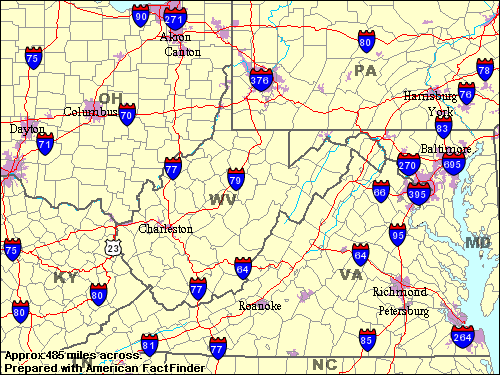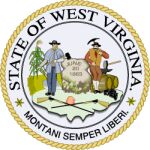|
Travel
& Geography
Travel to the United States | The States & Territories | The Regions of the United States | Facts & Statistics |
|
|
The
States, Districts and Territories of the United States
> West Virginia
|
|
|
||
 |
||
|
West Virginia, the "Mountain State"
Abbreviation: WV |
||
|
In 1861, Virginians in the northwestern part of the state defied Virginia's secession from the United States. The region chose to remain in the Union and form a new state. West Virginia was admitted as the 35th state into the Union in 1863, after conditions requiring the gradual emancipation of slaves had been met. The state motto is "Mountaineers are always free", and West Virginia lives up to its nickname of the "Mountain State". With an average altitude of 1,500 feet above sea level, it's the highest of any state east of the Mississippi River. For a long time, West Virginia was a leading producer of coal in North America, but many people left to pursue better employment opportunities. That trend has turned around, and now the state's economy is in a more stable condition. West Virginia, in the Appalachian Highlands, has some of the most rugged land in the United States. The state has very few large areas of level ground, except for strips of valley land that lie along the larger rivers. Forests of valuable hardwood trees grow on the mountain slopes and vast mineral deposits lie under the ground. Beautiful scenery, mineral springs and a variety of wildlife attracts tourists, campers, hunters and fishing enthusiasts. GOVERNMENT Population (July 2001): 1,800,975; National Rank: 37; Percent change since April 2000: -0.4 Land Area: 24,087 sq mi. (62,384 sq km); National Rank: 41 10 largest cities (2000): Charleston, 53,421; Huntington, 51,475; Parksburg, 33,099; Wheeling, 31,419; Morgantown, 26,809; Weirton, 20,411; Fairmont, 19,097; Beckley, 17,254; Clarksburg, 16,743; Martinsburg, 14,972 ECONOMY |
||
|
DISCLAIMER Any reference obtained from this server to a specific commercial product, process, or service does not constitute or imply an endorsement by the United States Government of the product, process, or service, or its producer or provider. The views and opinions expressed in any referenced document do not necessarily state or reflect those of the United States Government. |
|
U.S. Diplomatic Mission to Germany
/Public Affairs/ Information Resource Centers Updated: February 2004 |

